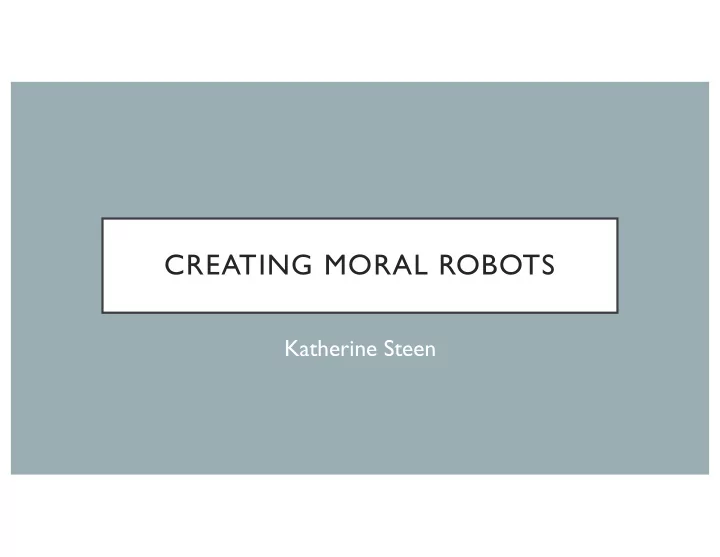

CREATING MORAL ROBOTS Katherine Steen
DEFINING TERMS • Robot – programmable machine that mimics human activities • AI – capability of a machine to imitate intelligence human behavior • Autonomous – independent/power to make own decisions • Morality – social set of standards for good or bad behavior
TYPES OF MORAL ROBOTS 1. Ethical Impact Agents 2. Implicit Ethical Agents 3. Explicit Ethical Agents 4. Full Ethical Agents
#1: ETHICAL IMPACT AGENTS • Ethical consequences for its actions
#2: IMPLICIT ETHICAL AGENTS • Employ some automatic ethical reaction to given situations
#3: EXPLICIT ETHICAL AGENTS • Similar to Implicit • In addition: they use general principles or rules of ethical conduct for various kinds of situations Nao Robot Video
#4: FULL ETHICAL AGENTS • Similar to Explicit • In addition: • Conscious • Intentionality • Free Will
DEFINING MORAL ROBOT • “an artificially intelligent machine with capabilities to make decisions based off a programmed set of social norms”
THE PROBLEM • Figuring out how to implement morals (right vs wrong) into robots when we do not know the answers ourselves
THE PROBLEM CONTINUED… • Norms: a standard or pattern, especially of social behavior, that is typical or expected of a group
THE THREE STEPS
#1: MEASURE SOCIETY’S MORALS • Define ethical behavior in measurable parameters • Agree upon the correct moral decisions for a robots
#2: COLLECT HUMAN MORALITY • Unbiased data of ethical processes from millions of people around the world Moral Machine Example
#3: MAKE ROBOTS TRANSPARENT • Public needs to know ethical values programmed into robots and their outcomes to trust them • Communication is key
CONTROVERSY • Fear of killer robots from sci-fi movies, video games, etc. • Should robots have morals?
#1: DE-HUMANIZED WORKERS • Will children and the elderly population be in the hands of emotionless robots instead of human empathy and sympathy they require? • Bias workers
#2: RESPONSIBILITY • Robots are in the hands of everyone (people with good and bad morals)
ETHICAL THEORIES • Kantianism • Rabota: “servitude of forced labor” • Theoretically, robots could have a conscious in the future • Creating moral robots is okay • Rule Utilitarianism • Beneficial Consequences: Improve the standard of living • Harmful Consequences: possible end of the human race • Harms are greater than Benefits à Creating moral robots is bad
THE FUTURE
MY OPINIONS • Excited for the future • Treat robots like teenagers • Fear society will restrict further research and development of moral robots
THE END References: Ethics for the information age • https://www.npr.org/2011/04/22/135634400/science-diction-the-origin-of-the-word-robot • https://www.robotshop.com/media/files/PDF/timeline.pdf • https://philosophynow.org/issues/72/Four_Kinds_of_Ethical_Robots • https://spectrum.ieee.org/video/robotics/robotics-software/how-to-build-a-moral-robot • https://www.nature.com/news/machine-ethics-the-robot-s-dilemma-1.17881 • https://www.geekwire.com/2018/ethics-ai-robots-will-rise-will-rule-us/ • https://www.weforum.org/agenda/2017/11/3-ways-to-build-more-moral-robots/ • https://dictionary.cambridge.org/us/dictionary/english/autonomous • http://moralmachine.mit.edu • https://www.weforum.org/agenda/2016/10/top-10-ethical-issues-in-artificial-intelligence/ • https://aeon.co/essays/creating-robots-capable-of-moral-reasoning-is-like-parenting •
QUESTIONS?
Recommend
More recommend